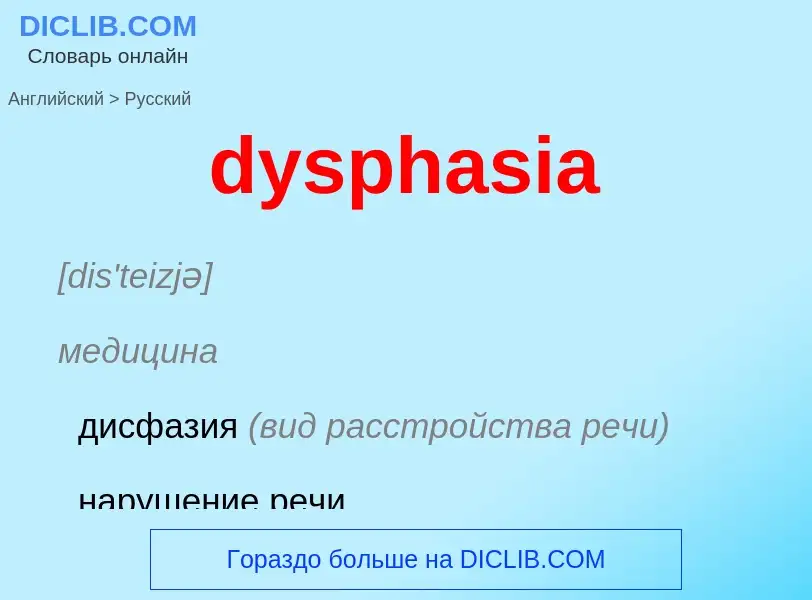Translation and analysis of words by ChatGPT artificial intelligence
On this page you can get a detailed analysis of a word or phrase, produced by the best artificial intelligence technology to date:
- how the word is used
- frequency of use
- it is used more often in oral or written speech
- word translation options
- usage examples (several phrases with translation)
- etymology
dysphasia - translation to russian
[dis'teizjə]
медицина
дисфазия (вид расстройства речи)
нарушение речи
существительное
медицина
дисфазия (вид расстройства речи)
неврология
афемия
медицина
афазический
Definition
Wikipedia

Aphasia is an inability to comprehend or formulate language because of damage to specific brain regions. The major causes are stroke and head trauma; prevalence is hard to determine but aphasia due to stroke is estimated to be 0.1–0.4% in the Global North. Aphasia can also be the result of brain tumors, brain infections, or neurodegenerative diseases (such as dementias).
To be diagnosed with aphasia, a person's speech or language must be significantly impaired in one (or more) of the four aspects of communication following acquired brain injury. Alternatively, in the case of progressive aphasia, it must have significantly declined over a short period of time. The four aspects of communication are auditory comprehension, verbal expression, reading and writing, and functional communication.
The difficulties of people with aphasia can range from occasional trouble finding words, to losing the ability to speak, read, or write; intelligence, however, is unaffected. Expressive language and receptive language can both be affected as well. Aphasia also affects visual language such as sign language. In contrast, the use of formulaic expressions in everyday communication is often preserved. For example, while a person with aphasia, particularly expressive aphasia (Broca's aphasia), may not be able to ask a loved one when their birthday is, they may still be able to sing "Happy Birthday". One prevalent deficit in the aphasias is anomia, which is a difficulty in finding the correct word.: 72
With aphasia, one or more modes of communication in the brain have been damaged and are therefore functioning incorrectly. Aphasia is not caused by damage to the brain that results in motor or sensory deficits, which produces abnormal speech; that is, aphasia is not related to the mechanics of speech but rather the individual's language cognition (although a person can have both problems, as an example, if they have a haemorrhage that damaged a large area of the brain). An individual's language is the socially shared set of rules, as well as the thought processes that go behind communication (as it affects both verbal and nonverbal language). It is not a result of a more peripheral motor or sensory difficulty, such as paralysis affecting the speech muscles or a general hearing impairment.
Neurodevelopmental forms of auditory processing disorder are differentiable from aphasia in that aphasia is by definition caused by acquired brain injury, but acquired epileptic aphasia has been viewed as a form of APD.


